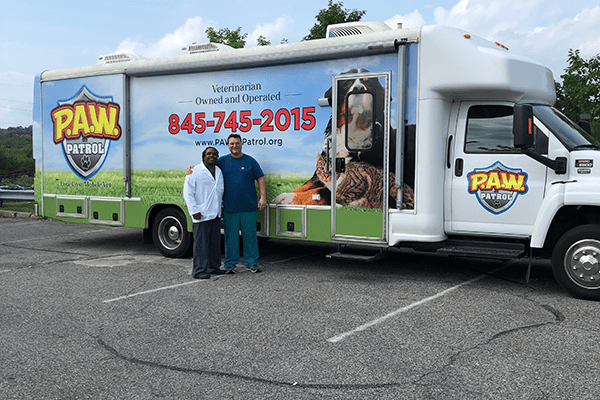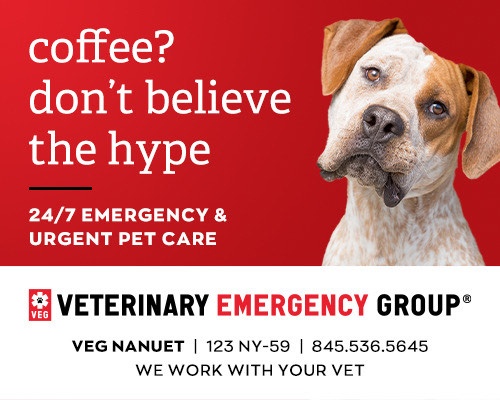P.A.W On Patrol Mobile Van Roving In Rockland
By Tina Traster
Veterinarian Leslie John has seen the worst of the worst treating sick and injured animals in emergency room clinics for the past 15 years. What’s crushed his soul the most, however, are the cats and dogs who could have been saved but for steep medical costs.
“In the emergency setting, you see pets that have issues that can be addressed medically, or saved but for lack of finances,” said John. “Countless dogs and cats are put down unnecessarily. The problem is the cost of veterinarian medicine.”
John, and veterinarian Michael Orban are partners in Brewster-based Putnam Animal Wellness, a low-cost veterinary clinic. Recently, the practice began to expand its reach into Rockland County with P.A.W. on Patrol, a mobile van that provides a weekly low-cost spay/neuter and dental services for dogs and cats.
The partners, both in their early forties, have worked together for years in emergency rooms, and at low-cost spay/neuter clinics. Over time they huddled together, trying to find a way to establish their own practice – but one that would provide affordable care. Both lament the costs of veterinarian medicine is sky high and precludes many from caring for pets, and for rescue groups to spay/neuter ferals to stem population growth.
A year ago, they bought the four-year-old Brewster-based Animal Kingdom Spay/Neuter Clinic’s client list, some equipment, furnishings, and the remaining lease for 1,500 square-feet inside the pet store Pet Kraze.
The clinic charges $65 for spay/neuter for a cat and $125 for a dog – a fraction of what most veterinarians charge in commercial practices.
“We’re having the same debate nationally about healthcare,” said John. “It should be a human right. I feel the same way about pets. There’s an obvious need for low cost vet services.”
Orban and John have a clear mission but the entrepreneurs also intend to make a living and run a profitable business.
So how does a clinic charging $20 for a visit compete?
“Veterinary medicine is a business where people want to make a certain amount of money,” said Orban. “I guess it comes down to how much money you need to make to live the life you want to live.”
Orban, like John, both hail from humble backgrounds in Queens. Orban was the first in his family to go to college. His father was a New York City firefighter, his mother a stay-at-home mom. John, too, grew up in a poor neighborhood. “I know what it’s like not to have much but to want to be able to take care of a cat or dog.”
To provide low-cost services, the pair are willing to work 70-hour weeks (John maintains a second job), refrain from paying themselves while they build the business, invest savings into equipment, treat 30 patients a day apiece, cater to rescue groups that bring in multiple cats, and take their practice on the road via a mobile van, which is essentially a roving advertisement. The pair intend to expand the van’s rounds to Dutchess and Orange counties.
To run a profitable business, the practice seeks competitive pricing on drugs.
Both Orban and John say the quality of care at their practice is no different than care at any veterinarian. What is different? The business model.
“Think of Henry Ford’s assembly line,” said John, explaining both doctors have honed skills that allow them to work exceptionally fast. Add to that, they have made spay/neuter their focus.
“It takes me 30 seconds to neuter a cat, whereas it might take another vet 20 minutes,” said John, explaining that because he and Orban have performed thousands of procedures, they are as efficient as a well-oiled factory. “A typical vet may have one spay a day, then a laceration, then maybe they have to remove an eye. We are trained surgeons who are mostly doing one thing all day every day. This allows us to be more proficient, which drives down costs.”
Orban further explains their methods, which they say adhere to current medical thinking from Maddie’s Conference, Alley Cat Allies, the Humane Alliance and the ASPCA, have moved away from practices such as intubation and intramuscular sedation.
“We believe many vets overdo the procedure,” said Orban. “Often that can cause trauma, take more time. We use a quick and efficient method but there’s nothing substandard about the way we do spay/neuter.”












